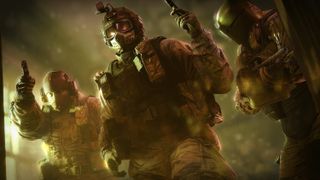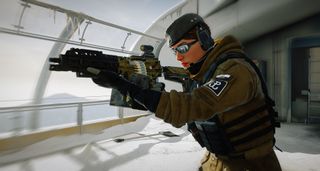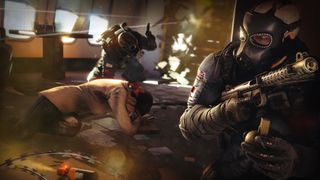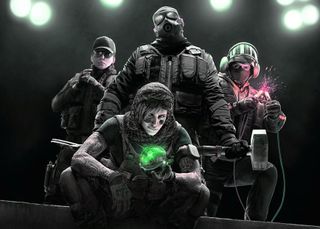How to buy Rainbow Six Siege
Which edition of Rainbow Six Siege should you buy? There's four of them.

Rainbow Six Siege gets my highest recommendation. Its tactical but forgiving gunplay and a varied map pool make it one of the best multiplayer FPSes on PC. Siege plays more deliberately than CS:GO, but there's still plenty of emphasis on aim, and it supports different skill levels through its 36 unique 'operator' characters.
Ubisoft's done a good job of supporting Siege continuously with new stuff, but buying Rainbow Six Siege has only become more complicated. Two years after release, the game has fragmented into four different editions on PC, ranging from $15 to $90. And there's a major difference between them: if you purchase the cheapest edition of the game, you'll pay significantly more in-game (non-cash) currency to unlock characters.

Which version of Rainbow Six Siege should I buy?
You should get the Standard Edition—I'd recommend it at $40, so it's a steal whenever it's on sale. Note that this is completely different from the Starter Edition, which you shouldn't buy, even when it's discounted.
You should buy the Standard Edition because you'll pay much less for operators. Owners of the Standard Edition can unlock the 20 'launch' operators (the ones that Siege launched with in 2015) at lower prices. These include useful characters like Mute, Rook, Pulse, and Thermite, most of whom see tons of play.
Buying the Starter Edition locks you into an objectively worse economy that you can't easily get out of.
If you own the Standard Edition, you'll pay just 500 renown to unlock your first operator within a 'unit'—the arbitrary, thematic spec-ops categories like the FBI SWAT, GIGN, SAS, or Spetznaz. After you buy your first operator within that unit, you'll pay 1000, 1500, and then 2000 to unlock the final, fourth operator in that unit. You can earn 500 renown in two or three matches, so it might take you 25 matches to unlock four characters in the same set. Pretty reasonable.
In the Starter Edition, however, unlocking any one these operators costs 12,500! Yikes. So for four of them, it's 10 times more expensive.
The cost of four operators, compared:
- Rainbow Six Siege Starter Edition: 50,000 renown (~60+ hours worth of gameplay)
- Rainbow Six Siege Standard Edition: 5000 renown (~12 hours of gameplay)
For reference, I've played Siege for 250 hours, and used renown to unlock 20 of the 36 operators (the rest I received automatically from the Season Pass). I still only have 40,000 renown banked. Don't buy the Starter Edition.
More recent operators are significantly more expensive for everyone. A 'seasonal' operator like Blackbeard is 25,000 for Starter or Standard owners, or 22,500 for Season Pass owners, who get a 10% discount on everything in the store.
The biggest gaming news, reviews and hardware deals
Keep up to date with the most important stories and the best deals, as picked by the PC Gamer team.

OK, but what do I get in the supposedly-bad Starter Edition? ($15)
The Starter Edition instantly unlocks two random Operators out of a possible six (Rook, Sledge, Ash, Fuze, Mute, or Smoke), plus enough cash currency to buy exactly two more. But again, beyond that, it'll take you about 15 hours of gameplay to unlock one more operator. And because there's a limit of one unique operator per team, if someone picks your main, you might be stuck running a recruit (an operator without any unique gadgets).
Buying the Starter Edition locks you into an objectively worse economy that you can't easily get out of. At this time there's no upgrade from Starter to Standard—the workaround for this would be to buy a large chunk of in-game currency and buy operators in Siege's in-game store as a bundle, but that isn't a great deal either.

What about the more expensive editions?

Rainbow Six Siege operators: the best around
Rainbow Six Siege Year 5: what you need to know
If you hate grinding and want everything immediately, "Year 2 Gold Edition" is a good deal when it's 50% off, but I can't recommend it at $70, its normal price. Buy it if you're confident you'll put at least 40 or 50 hours into Siege, or if you want the final set of Year 2 operators that came out in December 2017 (Dokkaebi, a wonderfully trolly Korean hacker), picking up the Year 2 Season Pass in this edition is worth it.
Don't worry about maps—all players immediately get access to any new maps that are added to Rainbow Six Siege.
The same logic applies to the $90 "Complete Edition"—you're paying to have everything (the 16 Year One and Year Two Season Pass operators), and in my experience, you'll probably only end up using half or two-thirds of the available operators anyway, since you're bound to develop preferences. Owners of either premium edition earn renown slightly faster (+5%), and can run two additional daily challenges to run even more renown, but having all this extra renown doesn't mean a lot when you already have all of the operators—you've got less stuff to spend it on.
The Complete Edition also won't get you the new operators and stuff coming in Year Three in 2018, although it's possible that Ubisoft will update this edition to include it.
Hey, doesn't this game have loot boxes?
Yeah—they're called "Alpha Packs." They only contain cosmetic items: weapon and operator skins of varying rarity, as well as 'charms,' a set of decorative keychains that can be attached to any primary or secondary weapon.
You can buy Alpha Packs with renown (5,000 per). But you also have a random chance to earn them after each match. From Ubisoft's FAQ: "When you complete a match, your Chance rating increases slightly more for a win than it will for a loss. Year 2 Pass holders will have a small amount of additional Chance added. The most substantial gain in Chance will be from winning and losing matches."
You don't have to pay to open Alpha Packs awarded to you by Siege, and you can also buy cosmetics individually or in bundles in Siege's in-game store for renown or R6 Credits, the game's cash currency.

Evan's a hardcore FPS enthusiast who joined PC Gamer in 2008. After an era spent publishing reviews, news, and cover features, he now oversees editorial operations for PC Gamer worldwide, including setting policy, training, and editing stories written by the wider team. His most-played FPSes are CS:GO, Team Fortress 2, Team Fortress Classic, Rainbow Six Siege, and Arma 2. His first multiplayer FPS was Quake 2, played on serial LAN in his uncle's basement, the ideal conditions for instilling a lifelong fondness for fragging. Evan also leads production of the PC Gaming Show, the annual E3 showcase event dedicated to PC gaming.
Most Popular


